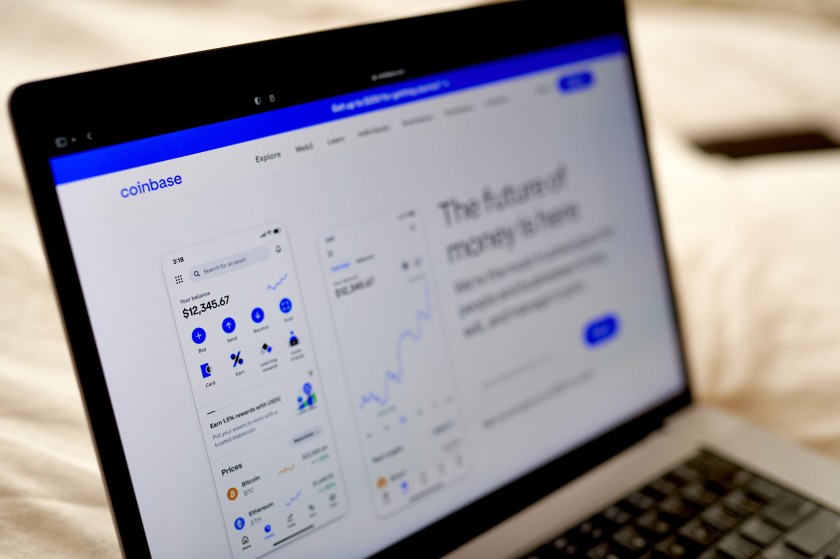
Crypto’s flagship company desperately needs a new business line to stay ahead of its legal troubles. Gabby Jones—Bloomberg/Getty Images
Coinbase is the most important company in crypto—and also the most frustrating. Even as it’s consolidated its role as the flag bearer of the industry, it has yet to land on a strategy for sustainable growth. Consider that for the last two years, the company’s revenues have been flat or declining and that it has failed to meaningfully diversify its business lines. Instead, Coinbase’s history has been one of feast and famine, where it rakes in cash from trading fees during crypto’s periodic bubbles and then splurges on acquisitions and new product lines in hopes they pan out while waiting for the next bull market.
This isn’t a bad strategy. It’s what companies do. Google has for years used funds from its golden goose search engine to branch out, and Apple does the same thing with its money-printing iPhone business. The problem for Coinbase is its core product—crypto exchange trading—is not a precious monopoly like Google Search or the iPhone, but instead a trading service that is rapidly becoming a commodity with the low margins that implies.
More worrisome is that Coinbase’s side bets aren’t doing so hot either. The company likes to tout its “services,” but a big chunk of that is windfall revenue from USDC—and while the margins here are great, the stablecoin’s market cap has declined dramatically in the last year. Meanwhile, Coinbase’s staking and blockchain business show signs of promise but are only bringing in scraps of revenue. Then there is the company’s longtime sideline of custody, which suddenly looks like a growth line thanks to an influx of ETF clients. But here, too, there’s a catch: Not only are BlackRock and the other ETF entrants likely to eat into Coinbase’s trading business, custody is a low-margin affair.
“The analysts estimate that the ETFs may only add $25 million to $30 million in custody fees, as well as up to $210 million in incremental Bitcoin trading revenue on the platform. That’s a relative drop in the bucket compared with Coinbase’s total [quarterly] revenue of $2.15 billion,” Bloomberg reported.
All of this reflects the same old story for Coinbase. This year, though, it feels like the trajectory of the company is set for a major change—but it’s too soon to say if it will be in a positive or negative direction. Let’s start with the bad news, gloomy scenario, which will come to pass if the SEC prevails over Coinbase by persuading a judge that the company’s basic business operation is illegal. Coinbase is so far holding its own in court (see Leo’s helpful summary here), but many legal watchers say the odds are against it. If the SEC wins, you can expect its revenue to fall by at least a third and its share price to drop to the point it becomes an acquisition target for one of the big Wall Street firms that have taken a shine to crypto. (Yes, founder Brian Armstrong still has majority control of Coinbase’s shares, but he is a young CEO with diverse interests who could well decide it’s time to sell and do something new).
That’s how Coinbase could take a major turn for the worse. If you want the rosy scenario, it involves the company beating the SEC in court—or at least holding it off long enough for its most promising new business line to emerge as a full-blown winner. That business is its offshore derivatives operation that is off to a strong start. I spoke to CoinFund’s David Pakman, who is one of the sharpest crypto watchers I know, and he noted that there is a window of opportunity for Coinbase to become a market leader in the field. He noted that the former dominant players in the derivatives market, FTX and Binance, are either dead or hobbled, and that many offshore traders are ready for Coinbase’s staid, respectable brand of crypto. Pakman added that, if the equities market is any predictor, the crypto derivatives business could grow many times bigger than the spot one.
So there you have it. Coinbase has been in the same rut for a long time, but 2024 is likely to be the year things change dramatically—for better or worse.
Jeff John Roberts
jeff.roberts@fortune.com
@jeffjohnroberts
DECENTRALIZED NEWS
Crypto trading in China is thriving despite a strict ban as users arrange exchanges via VPNs and meet-ups in cafes and laundromats. (WSJ)
The IRS announced it is not immediately going forward with a controversial rule that would have required crypto users to immediately report any transaction over $10,000. (Decrypt)
Cathie Wood’s Ark Invest has been selling Bitcoin future shares and buying up shares in its new sister ETF operation in order to try and build marketshare in the hyper-competitive field. (Bloomberg)
In the latest of his periodic denunciations of crypto, JPMorgan‘s CEO blasted it as a “pet rock” and said he’s “done talking about it.” (Fortune)
BlackRock led the new Bitcoin ETFs with inflows of $723 million, followed by Fidelity’s $545 million, while Grayscale had $1.18 billion of net outflows. (FT)
MEME O’ THE MOMENT
This news is republished from another source. You can check the original article here

